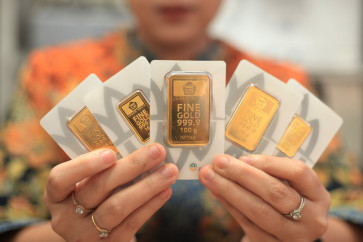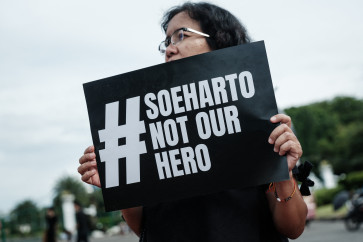Popular Reads
Top Results
Can't find what you're looking for?
View all search resultsPopular Reads
Top Results
Can't find what you're looking for?
View all search resultsIpang Wahid: The truth well told
JP/Dina IndrasafitriIrfan Asy’ari Sudirman, also known as Ipang Wahid, decided to pursue a slightly different path than many of the other famous figures who share his last name, like late former president Abdurrahman Wahid, popularly known as Gus Dur, or politician and activist Yenny Wahid
Change text size
Gift Premium Articles
to Anyone
JP/Dina Indrasafitri
Irfan Asy’ari Sudirman, also known as Ipang Wahid, decided to pursue a slightly different path than many of the other famous figures who share his last name, like late former president Abdurrahman Wahid, popularly known as Gus Dur, or politician and activist Yenny Wahid.
While the Wahid clan is widely associated with Indonesia’s largest Muslim organization Nahdlatul Ulama (NU) and the National Awakening Party (PKB), Ipang’s work involves neither.
The son of Gus Dur’s younger brother, Solahuddin Wahid, is a director and entrepreneur working with five different companies mostly associated with art or marketing.
Most people recognize Ipang’s work through his television advertisements of colossal scope depicting noble values such as honesty and hard work.
“I have made around 400 advertisements. I was once seen as a ‘very Indonesian’ director, and then I became a very stylish director, and then a very storytelling one. Actually, the trend for corporate advertisements is those with a grand feel ... so that’s how people eventually saw me as having that [grand signature style]. But actually that’s not how it is, but I do enjoy [creating advertisements] that are related to human beings,” he said.
And apparently the apple didn’t fall very far from the tree. While most Indonesian advertising directors prefer to do purely corporate and commercial work, Ipang does plenty of work with politicians and government institutions and work related to sociopolitical issues in general.
His list of previous and current clients includes the Prosperous Justice Party (PKS), the Adang Daradjatun–Dani Anwar pair who ran in the Jakarta gubernatorial election in 2007, President Susilo Bambang Yudhoyono’s Democratic Party, and the Jusuf Kalla–Wiranto pair, who ran in the presidential election in 2009.
His media communications company Fastcomm is currently handling the communications and campaign work for the Jakarta administration and the Industry Ministry.
One of the branding projects for Jakarta Governor Fauzi Bowo includes the replacing of displays of photos of the governor with more comical looking caricatures.
Another company that is keeping Ipang busy is Nyunyu, an Internet portal and digital consulting agency. Working with young fiction writer Raditya Dika and the figure behind the Twitter account “pocong”, he is seeking to boost the creativity of a local young audience.
“It’s really exciting. The target audience is between 14 and 25 … We are directing their lives toward something cool. It’s moving slow but someone has to start something if we don’t want to be a country
that only likes to talk about other people through infotainment shows and look for other people’s mistakes,” he said.
Nyunyu’s website includes various humorous discussion forums and a channel where participants can upload their videos.
Ipang’s current passion is social marketing, which he defines as an effort to “make change in society for the better. This is not conventional above-the-line marketing.”
To do this, he sees politicians and the government as potential partners.
“People said to me, ‘Why do you bother helping out ministries?’ and I said that is precisely the challenge ... like how we can persuade people to plant trees … to muster concern for orangutans, or to focus on entrepreneurship,” Ipang said.
He said he is currently pushing one ministry to campaign for entrepreneurship as a tool to fight corruption.
“The only way to fight corruption aside from law enforcement is to maximize the other side of people. How to be rich through hard work, to appreciate ourselves and creativity not by stealing here and there,” Ipang said.
According to him, his method in marketing political figures and parties always refrains from discrediting other parties.
“The worst scenario is telling the truth but not the whole truth … the best is the truth well told. It’s just different angles, a matter of perception. Perceived quality is not equal to actual quality. It’s just a matter of how we build this perceived quality,” Ipang said.
There were several times when he had to work with people whose values he did not completely agree with. As a result, he failed to go all-out in his effort, but luckily the partnership failed to last long either.
More than once, Ipang’s choice to work with certain political parties or people was somewhat controversial. One example is his work with the Democratic Party, which, according to him, at one point earned him an accusation from current graft suspect Muhammad Nazaruddin, who had been the party’s treasurer.
“I was accused of receiving Rp 20 billion [US$2.2 million] … I just laughed, I took it easy,” he said.
Another move deemed controversial was his work with the PKS.
“My closeness to the PKS obviously contributes its own colors and slander. You know how NU never really mixed with the PKS. I was accused of being a wahhabi and so on. People say, ‘What’s a blueblood of NU doing being close with the PKS?’ I would say that is my business with God,” Ipang said.
He added that he is used to discussing things with people from various Islamic schools of thought. As a matter of fact, his wife is the niece of Din Syamsuddin from Muhammadiyah, a local Islamic organization sometimes seen as having opinions opposing to NU.
“NU and Muhammadiyah meet at my house … I used to be really close to Ustadz Arifin Ilham … to the late Aa Buya Syech Ashari Muhammad, who leads the Darul Arqom Malaysia … I can discuss things with Ulil [Abshar Abdalla from the Liberal Islam Network], but I can also get along with hard-liners,” Ipang said.
His family’s teachings, although Islamic, also weren’t overly strict either, he said of his childhood.
“My father used to play guitar every day. I learned how to play guitar from him. He still plays, I think,” Ipang said.
After finishing his studies at the Jakarta Art Institute in visual communications design, he went to the US to study music and video.
Ipang arrived in the US in the early 1990s during the heyday of alternative music. And he was in Seattle, which was inarguably the eye of the storm. He recalled working in clubs and seeing bands such as Nirvana and Pearl Jam live.
“I used to be rock and roll … I had a band that played the Rolling Stones,” he said, smiling. Currently, his music taste leans more toward jazz.
Yet, again, the apple has not fallen that far from the tree. Or perhaps it rolled back closer. Whenever he finds himself caught up in conflict, he usually prays. His 2001 haj pilgrimage has made him “slightly better”.
His family taught him more than religious values, Ipang said. When he first wanted to start his own business back in his university days, he had to make a business proposal to give to his parents to borrow the capital.
“I borrowed Rp 1.5 million for an angkot business, the proposal had the policies on money return and everything but I failed to return the money. The business failed,” Ipang said, laughing.










